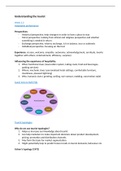Understanding the tourist
Week 2.2
Hospitality performance
Perspectives:
- Historical perspective, help strangers in order to have a place to stay
- Moral perspective, looking from ethical and religious perspective and whether
something is needed in return.
- Exchange perspective, what to exchange, is it in balance, true or authentic
- Individual perspective, focusing on the host
Experience: at ease, welcome, empathy, autonomy, acknowledgement, servitude, (works
together with others; entertainment, efficiency, surprise).
Influencing the experience of hospitality:
1. What, functional clues (reservation system, taking coats, food and beverages,
parking services)
2. Where, mechanic clues ( personalised hotel settings, comfortable furniture,
cleanliness, pleasant lightning)
3. Who, humanic clues ( greeting, smiling, eye-contact, nodding, converstion style)
Guest lecture Ruth Pijls
Tourist typologies
Why do we use tourist typologies?
1. Helps us increase our knowledge about tourist
2. Can help marketers to make important decisions about product development,
pricing, promotion and distribution channels.
3. May form the basis for market segmentation.
4. Might potentially help to predict future trends in tourist demands, behaviour etc.
Cohen’s typology (1972)
, Cohen argues that while traveling tourists are searching for novelty and the unknown.
Furthermore they need an extent of familiarity to enjoy the experience: an ‘environmental
bubble’. The extent to which tourists are hiding in this bubble, or are looking for the
unknown is the basis of this typology.
1. Organized mass tourist
2. Individual mass tourist
3. The explorer
4. The drifter
Smith typology
1) Explorers,
A small group who travels more or less as anthropologists.
2) Elite tourists,
Experienced travellers who often go on holiday. They love ‘tailormade’ (self
developed) trips.
3) Off-beat tourists,
Want to stay away from other tourists as much as possible.
4) Unusual tourists,
Make side trips off organized tours so they can experience the local culture.
5) Incipient mass tourists,
Tourists who travel to areas where tourism is less dominant.
6) Mass tourists,
Have the same expectations as when they are at home.
7) Charter tourists,
Have less until no interest in the destination itself. Want to be entertained and
several standards regarding f&b and accommodation.
Plog typology (1974)
Plog was looking for a direct link between personal characteristics and the behavior of
tourists. The result were two categories:
1) Psychocentric
2) Allocentric
Later, energy has been added to this model. This describes the extent to which tourists
would like to undertake activities during their holiday.
Critique on the typologies
• Typologies are based on simplistic and Western-based stereotypes, and don’t
encompass the complex patterns and cultural differences we see in the real world.
• It does not take into account the increasing diversity of holidays and destinations.
• Almost all typologies are static, and leave no room for individuals to move between
types in response to changes in for example time, health, income, leisure time, and
travel experiences.
• Typologies don’t recognize that many individuals have no autonomy over their
choice of holiday destinations and activities, for example because they are part of a
group. People are constrained by personal and situational circumstances.





